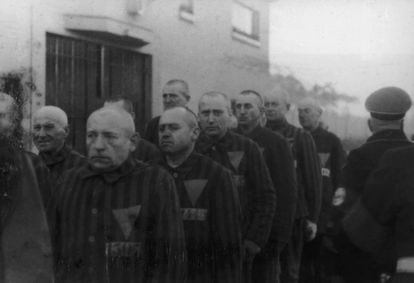
The German Justice has sentenced Josef Schütz, a 101-year-old man, to five years in prison for his role as a guard at the Sachsenhausen Nazi concentration camp, on the outskirts of Berlin. In a new but forceful chapter in his long history to compensate the victims of the camps, the judges have considered that in his former job the defendant was an accomplice in the murder of 3,518 prisoners.
“Mr Schütz, you had an active role for three years in the Sachsenhausen concentration camp, where you were an accessory to mass murder,” said the president of the court, Udo Lechtermann. The magistrate has also affirmed that Schütz, who was an SS non-commissioned officer, supported with his presence the acts committed in the camp between 1942 and 1945. “All the people who wanted to flee the camp were shot. Therefore, any guard of the field actively participated in these murders, “explained the judge.
“I am ready,” said the old man, sitting in a wheelchair, wearing a gray shirt and pajama pants, at the Brandenburg Territorial Court, where he had been transferred for the verdict. His lawyer had already announced that if he received a very harsh sentence, he would appeal it, which would delay the execution of the sentence until the beginning of 2023. Given the advanced age and fragile state of health of the accused, who appears free, it is unlikely to be imprisoned.
For the Prosecution, Schütz aided and abetted the “execution by firing squad of Soviet prisoners of war in 1942.” He also considers him to be a collaborator in the murder of inmates “using the poisonous Zyklon B gas.” He was 21 years old. The Neuruppin Prosecutor’s Office, which has led the case, made the decision to take him to trial after obtaining evidence that he knew what was happening in the camp, although he did not directly participate in the murders, chief prosecutor Cyrill explained to EL PAÍS. Clement. “I don’t know why I’m here. I say the truth. I have nothing to do with the Police or the Army, everything that was said is false”, the accused has limited himself to saying.
During his statements, the man has offered various stories about his past, sometimes contradictory. Recently, he claimed to have left Lithuania at the beginning of World War II to arrive in Germany, where he would have worked as a farm worker throughout the conflict. “I have uprooted and planted trees,” he said.
A version that has been challenged by several historical documents in which, among others, his name and date and place of birth appear. Those papers also showed that, in fact, Schütz had been assigned between 1943 and 1945 to the elite division Totenkopf (skull in German) of the SS. After the war, he was detained in a prison camp in Russia. Upon leaving him, he moved to the town of Neuruppin, in the Brandenburg region, where he has lived as a farmer and locksmith and without worrying about his past. During the trial, which began in October 2021, the man showed no remorse about his actions as a security guard in Sachsenhausen.

“This sentence corresponds to the expectations of the plaintiffs. Justice was done”, has celebrated the lawyer Thomas Walther, who represents 11 of the 16 civil parties that have been part of the process. The defendant’s lawyer, Stefan Waterkamp, cited a ruling by the Federal Court of Justice in Karlsruhe to argue that the fact of having worked as a guard in a concentration camp should not be enough to issue a guilty verdict.
Sachsenhausen was established in 1936 north of Berlin as the first Nazi camp run by the SS, which had been given full control of the system on Hitler’s orders. It was intended to be a model facility for the network the Nazis later built in Germany, Austria, and the occupied territories. More than 200,000 people, including Jews, Gypsies, opponents of the Nazi regime and homosexuals, were imprisoned in Sachsenhausen between 1936 and 1945. Tens of thousands of inmates were murdered or died as a result of forced labor. More than 200 Spaniards were also interned there – at least 22 lost their lives – all Republican fighters who had fled to France at the end of the Civil War. The most prominent was Francisco Largo Caballero, who was occupying a cot in the camp’s medicine cabinet when Soviet troops arrived to free him on April 22, 1945. Medical experiments, starvation or disease were common until the camp was liberated, according to explained in the Sachsenhausen Museum.
Follow all the international information in Facebook Y Twitteror in our weekly newsletter.
Source: EL PAIS
